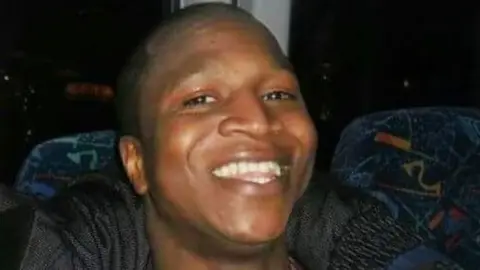Sheku Bayoh: Armed suspects should be contained, inquiry told
 BBC
BBCThe primary focus of police officers dealing with an armed suspect is to "contain rather than restrain", an inquiry has heard.
Joanne Caffrey, an expert on the use of force, told the Sheku Bayoh inquiry this should be the case unless they can justify otherwise.
Mr Bayoh, 31, died in May 2015 after he was restrained on the ground by six police officers in Kirkcaldy, Fife.
The inquiry into his death entered its second stage last week.
It is investigating the circumstances around the father-of-two's death and whether race was a factor in the way the police handled the incident.
PC Craig Walker and PC Alan Paton were first on the scene after reports from members of the public that Mr Bayoh had been carrying a knife and attacking vehicles.
They previously told the inquiry in Edinburgh that when they arrived at Hayfield Road, they deployed their incapacitant sprays on the gas engineer after he failed to listen to their instructions.
Ms Caffrey told the inquiry, led by Lord Bracadale, that the "primary focus for dealing with any kind of bladed weapon is contain rather than restrain".
She told Angela Grahame KC, the inquiry's senior counsel: "To put a containment, you can't contain someone in an open place with just two.
"If four or six turned up together, you have got a really good chance of containment."
She said containment would be the "preferred option unless it can be shown why it wasn't".
The inquiry heard Ms Caffrey agreed it would have been reasonable for armed response vehicles to have been contacted, and for them not to be deployed but to have waited for feedback.
The inquiry also heard how a dog unit on scene could affect a suspect. On the day Mr Bayou died a dog unit had been called for.
She told the hearing about rendezvous points, and how they are used to make sure multiple units arrive at the scene.
Ms Caffrey said it was not reasonable for just one unit to attend, because it was an incident above the level described as "business as usual" given the reports that a knife was involved.
Circumstances were put to Ms Caffrey through the lens of what a hypothetical "reasonable officer" would do.
Ms Caffrey agreed a reasonable officer would only use force which was reasonable, proportionate, and the minimum necessary.
She also agreed that the least forceful option must be attempted or considered and found to be inappropriate in the circumstances before other methods were considered.
Ms Caffrey, a former police officer, has been involved in around 150 case reports over the past five years dealing with deaths in custody, police custody procedures and use of force.
Racist abuse
Mr Bayoh died after being restrained by officers who were called after he was seen behaving erratically with a knife.
He was restrained for five minutes before falling unconscious and was pronounced dead in hospital a short time later.
Police officers involved in the restraint gave evidence to the inquiry during the summer.
Last week a judge condemned the racist abuse experienced by Mr Bayoh's family during the public inquiry into his death.
Lord Bracadale said family members of Sheku Bayoh had received the abuse "on social media or in writing".
Kadi Johnson, Mr Bayoh's sister, received the abuse after she told the inquiry that she no longer felt safe in Scotland.
The abuse was revealed in a BBC Disclosure programme called How Did Sheku Bayoh Die?
